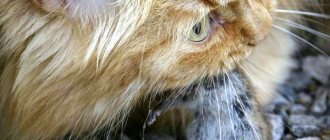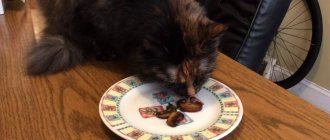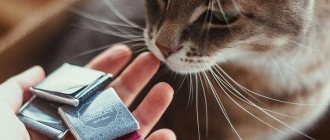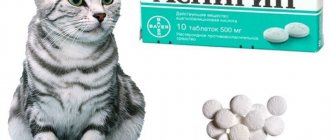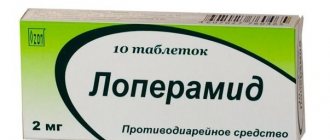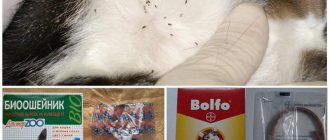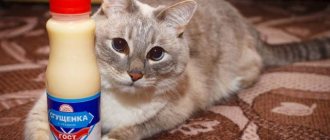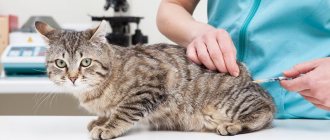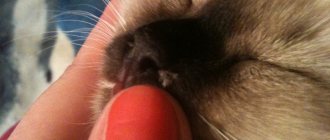≡ Home → Valerian → About valerian →
Cats are very sensitive to the aroma of valerian. All they need to do is sniff a plant or drug a little for their behavior to immediately change. The cats begin to feel euphoric, they try to lick the product, rub against it, but at the same time they have little control over themselves and drool. After this, many cats become more affectionate and gentle, others, on the contrary, become aggressive and restless. When the period of hyperactivity ends, the animals fall asleep for a long time.
Cats are drawn to valerian in all forms - dried roots, extract tablets and even tincture
Some owners use the cats' partiality for valerian to accustom the cat to a tray or scratching post, to lure it somewhere or lure it out from somewhere. However, you can decide how justified and safe it is for the animal only by understanding how valerian affects the health and well-being of the cat.
Why do cats love valerian so much?
Felinologists have still not come to a consensus why cats love valerian so much. To answer this question, they are guided by 2 theories:
- The smell of the grass is similar to cat pheromones released by females during estrus. The aroma is achieved thanks to the volatile substance contained in the extract.
- The smell of the grass is similar to the odorous marks left by all males of the cat family. This theory is confirmed by the fact that the behavior of domestic and wild felines is identical.
In both theories, love for the plant is explained by stimulation of sexual desire. This fact is confirmed by the fact that kittens are not at all interested in valerian.
An interesting feature of the aroma of the plant
So why are cats so attracted and excited by the scent of valerian, while humans are calmed by it? In other words, we can say that this plant is a kind of drug for our little brothers. Valerian extract causes cats to become intoxicated.
They really like it. Smelling this alluring aroma, cats begin to wriggle and purr loudly. If by chance, while walking, they come across a growing valerian in a clearing, they will immediately begin to ride on it, jump, do whatever they want to make the grass release its juices. But not everything is so good.
How does valerian affect cats?
In addition to stimulating sexual desire, the plant causes narcotic intoxication. Because of this, it is important to understand the boundaries of what is permitted and the possible harm from using a human medicinal product.
Animal behavior
It is impossible to say exactly what will happen if you give a cat valerian. The body's reaction is individual, but in most cases it is accompanied by:
- strong sexual arousal;
- loss of coordination and disorientation;
- aggressive behavior;
- rolling on the floor, scratching or rubbing against an object that retains traces of the tincture;
- copious flow of saliva;
- hissing and trying to hide due to a sudden panic attack;
- hallucinations (catching invisible prey or escaping from a non-existent enemy).
The state of euphoria and excitement lasts up to half an hour. All this time, the central nervous system is actively working, so when the effect ends, the animal falls into deep sleep due to severe nervous exhaustion.
The intensity of a cat's reaction to valerian depends on gender, age and breed. A longer lasting effect is typical for sexually mature males, including castrated ones. Of the females, only 30% react. Kittens either ignore the smell or are afraid of it. Also, little interest is typical for representatives of the Siamese breed.
Harm or benefit?
Due to the way valerian affects cats, its use is only permissible as prescribed by a veterinarian. Medicinal tincture is prescribed for:
- heart pathologies;
- hyperthyroidism;
- diseases of the gastrointestinal tract;
- eczema;
- frequent outbursts of aggression.
Harm can only be avoided with the correct dosage. In all other cases, the substance quickly causes addiction, behavioral disorders, loss of weight and coat quality.
Can a cat become an “alcoholic” or a “drug addict”?
Valerian for cats is a real drug. With regular stimulation of CNS receptors, they become dependent. In search of a new dose, the animal begins to look into the cabinets and constantly scream, demanding the drug from the owner.
How to influence a cat with valerian
In addition to treatment, some owners use the plant to accustom them to scratching posts and litter boxes, as well as to calm their pets during estrus. Due to the possible harm, the safety of these actions remains a big question.
Training to a scratching post or tray
It is better to accustom him to the toilet and scratching post from childhood. The plant has no effect on kittens, so it is better to choose safer and more effective drugs. Drops are suitable for adult animals, but it is better not to abuse such a training tool.
Is Valerian good for calming cats?
Reducing sexual desire by stimulating it is a disastrous idea. After valerian, cats become even more excited. Their behavior is very difficult to predict, and an incorrectly selected dosage can cause addiction in the animal.
If the smell of a volatile substance can deceive the pet, creating the illusion of the presence of the opposite sex, then such an effect will be short-lived. It won't solve the problem, so it's best to see a veterinarian.
In all cases, sterilization remains the most effective solution. The operation not only eliminates sexual desire and the ability to conceive, but also prevents the development of cancer.
Can I give it to a kitten?
Valerian infusion should be given to a small kitten only as prescribed by a doctor. Some pet owners use it to train kittens to use a scratching post.
To do this, the column is lightly rubbed with tincture, the smell of which the kitten likes. However, up to 3-4 months they may not respond to such a tempting smell, and the method turns out to be ineffective.
What to choose: roots, drops or tablets
The drug has 3 dosage forms: roots, drops and tablets. If you choose valerian for cats, then it is better to avoid tablets and alcohol tinctures. Ethyl alcohol contained in drops can burn the mucous membrane, cause alcohol intoxication and harm the kidneys and liver. The danger of tablets lies in their fillers. The abundance of synthetic substances (75% of the total composition) is fraught with allergic reactions and constipation.
If the doctor recommended a plant for treatment, then it is given to the animal in its natural form - that is, in the roots. You can also prepare a decoction or infusion from the roots, but without adding alcohol.
Cat alcoholism
The composition of valerian roots is quite diverse. It contains alkaloids, esters, tannins, resin, sugar, glucosides, etc. In addition, ethyl alcohol quickly causes alcohol intoxication and addiction. The animals' heartbeat quickens, their blood pressure rises, and after a while they become lethargic and cannot stand on their feet.
Therefore, the expression “cat alcoholism” is not an empty phrase. Animals cannot resist alcohol. As soon as they smell valerian or take a pill, they immediately become drunk, that is, cats “get drunk.” Often, many of them fall into a deep, drunken sleep, which is typical for people.
Can an overdose happen?
In addition to an allergic reaction, the animal may experience an overdose. It is accompanied by:
- complete loss of coordination;
- falling on the side;
- rolling your eyes;
- convulsions;
- copious discharge of foam from the mouth.
If these signs appear, you must immediately take your pet to the veterinary clinic. Otherwise, he may die from cardiac arrest.
To avoid overdose, strictly follow all doctor's recommendations and do not self-medicate. Remember that all medications should be kept out of the reach of pets.
Why are different valerian preparations dangerous for cats?
As you know, valerian comes in the form of tinctures, tablets, capsules, drops, and vitamin supplements. The tincture is also dangerous because it contains alcohol, which has a detrimental effect on four-legged animals, causing them to become dependent on alcohol.
How do valerian tablets work on cats and how many pieces can you give them at one time? This question is often asked by inexperienced cat owners. It turned out that the latter are much more dangerous than the tincture. This is explained by the fact that the tablets contain only one-fourth of valerian itself, the rest are auxiliary substances that can cause severe allergies in cats.
Important! If your pet immediately falls asleep after swallowing the tablets, then it should be taken to a veterinary clinic immediately.
Overdose symptoms
As soon as you drink the medicine, the cats will ask for it again and again. Even if the owner does not give his pet valerian on principle, it may accidentally fall and break. Your four-legged friend will not hesitate to rush and lick this “delicacy”, and they may experience the following symptoms:
- cats lose coordination of movement;
- the limbs do not yield to him, do not serve him;
- the cat falls on its side;
- eyes roll into the forehead;
- strong convulsions run through the body;
- copious foam flows from the mouth.
All of these signs indicate that your pet is overdosing on medication. In such cases, you cannot hesitate; you need to urgently take him to the clinic.
Conclusion: to give or not to give?
The use of valerian for cats for medicinal purposes is practiced very rarely and only as part of auxiliary therapy. In most cases, it is safer to use alternative medications and herbs.
When is Valerian good for cats?
The use of roots and decoctions is permissible for thyroid dysfunction, fever, intestinal spasms, neuroses and muscle atony. In addition to preventing serious pathologies, the herb can help increase activity and restore appetite.
The disadvantages of the plant outweigh its advantages. When treating pets, it is better to use safer drugs, the reaction to which is easier to predict.
Alternative plants
Instead of valerian, it is better to buy catnip (catnip) for cats. It has a similar stimulating effect on the body, but its effect is more gentle. To get the effect, it is enough for the animal to sniff and not swallow the mint. This eliminates the possibility of dependence.
Most often, dried mint is added to toys. After switching attention to another object, the pet comes to its senses within 10-15 minutes. Training with mint is less effective, but safer. The disadvantage of this plant is that a very small percentage of cats experience euphoria from it.
As a sedative, it is recommended to use drops and sprays with pheromones (No Stress Spot On, Feliway). These drugs are made from natural ingredients, so in the absence of allergies, they can be used to modulate behavior.
Knowing all the possible dangers, you should not check what will happen when a cat and valerian meet. This meeting can leave a lasting impression on a mustachioed pet, making him addicted to a harmful tincture. Remember that this practice can result in death. It is better to buy your pet a toy with catnip or consult a doctor for a prescription for a safer drug.
The article is for informational purposes only. Contact your veterinarian!
